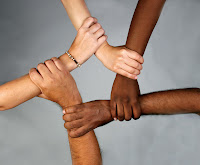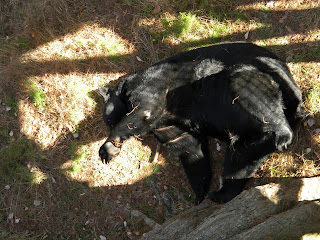I found a very interesting website this week when I was watching tv. It's called TheMoreYouKnow.com.
This website is a public service that promotes raising awareness of the country's most important social issues and motivating people to take action. This year, 4 particular topics were focused on: Diversity, Education, Health, and the Environment.
Diversity
We have talked about diversity many times in our class this semester and the description of diversity this site gives is very fitting. " People differ in many ways along a variety of dimensions, including race, ethnicity, religion, gender, physical and mental ability, sexual orientation, age, education, socioeconomic status, language, and political beliefs.
Some helpful tools to enhance diversity:
- Be mindful of your actions and words. Your manner of speech and any jokes that you make are good cues of your inner values and thoughts.
- Speak out against jokes and comments that target certain groups.
- Be more aware of how your cultural background influences how you understand and experience the world in order to understand and respect others.
- Share the characteristics that make you unique with others.
- Cook a national/ethnic dish of your cultural origins for others and share how it reflects some aspect of your culture.
- Read literature from various authors and countries that provide different perspectives.
- Join an organization promoting diversity.
- Set a good example for others around you.
- Have an open mind.
Education
Something very important to remember about education is that nothing speaks to a child's future like a quality education. Education is often the road out of poverty regardless of a person's race, ethnicity, or socioeconomic background.
Some helpful tools to enhance education:

- Take time out of your workday to go to your parent-teacher conference; it may be the most important meeting you attend all year.
- Ask your child’s teacher how he or she is doing academically. Ask if your child is on the right track for his or her age.
- Be aware of skills required for each grade level and whether or not your child meets these requirements.
- Join a PTA, parent organization, committee, or advisory council to help make decisions regarding school policies or practices.
- Be an advocate for your child; make sure the school is providing all of the necessary resources to promote his or her growth.
- Monitor your child's performance with report cards and grades on tests.
- Be conscious of homework policies and homework assignments.
- Be available to help your child with any homework that is difficult for him or her.
- Listen to your child and anything he or she has to say about school, including comments about teachers, tests and any difficulties understanding concepts.
- Talk with your high schooler about college and college visits.
Environment
Going green is about improving quality of life through green living. Start by adopting one simple, everyday sustainable action into your daily routine. An action is considered more sustainable when it positively affects you, your family, your community, your workplace and your planet. There are many things you can do to help the environment, but it is important that you choose an action that makes you happy and makes sense in your life. We invite you to adopt this practice for a period of 30 days. Studies show that once you’ve incorporated your action into your routine for one month, chances are, you’ll stick with it for life. Try to measure your progress to see how your actions can add up to make a big impact; the satisfaction from tracking success will encourage you to stick with your routine and pass it on to family and friends.
Some helpful tools to help our environment:
Whether you're at home, at work, at the store, or on the go, daily habits and simply being environmentally conscious can go a long way towards conserving natural resources, decreasing unnecessary waste and fundamentally protecting the world we live in.
AT HOME:
- Wash laundry in cold water
- Dry clothes on a line rather than in the dryer
- Turn off the water while brushing teeth
- Use environmentally friendly soaps and cleaners
- Use only a pencil-width flow of water at the sink
- Switch to compact fluorescent light bulbs (CFLs)
- Insulate your walls and ceilings to keep air from escaping your home
- Clean or replace filters on your furnace and air conditioner
- Move the temperature on your thermostat down two degrees in the winter and up two degrees in the summer
- Unplug electronics in standby mode
- Save waste by removing yourself from junk mailing lists
- Pay bills online
- Go outside to exercise
- Run your dishwasher only when it's full
- Repair leaky faucets and toilets right away
- Reduce and reuse daily waste
AT WORK - Take the stairs instead of the elevator
- Use recycled paper
- Print reports and memos on both sides of the page
- Use reusable mugs for the water cooler and your morning coffee
- Ship packages in reusable cardboard boxes and make packing material out of shredded waste paper
- Get in the habit of shutting down and unplugging your computer at the end of the day
AT THE STORE - Plan shopping lists to avoid multiple trips to the store
- Look for food that is fresh, organic or locally grown
- Buy bulk for your family at the supermarket
- Carry reusable shopping bags
- Give presents in reusable gifts bags
- Wear vintage or organic cotton clothing
- Choose recycled or reusable products
IN TRANSIT - Drive less - try walking, biking, roller blading, using mass transit or carpooling with a friend
- Lighten your load - take only what you need in your car's trunk to increase fuel efficiency
- Consider rolling down the windows instead of using the air conditioner
- Use windshield shades to keep your car cool in the summer and keep frost away in the winter
- When in the market for a new car, choose the most fuel-efficient model that fits your budget and lifestyle
- Keep tires properly inflated and get a regular car tune up
- Check into your community's car sharing organization.































